CLICK HERE TO PURCHASE COURSE HANDBOOK!
1">CLICK HERE TO ORDER YOUR OFFICIAL COURSE HANDBOOK!How Scotty Teaches Guitar
We asked Scotty to tell you what he feels are the most important guitar lessons he can teach you and why he thinks his program is your best chance to become a truly satisfied guitar player.
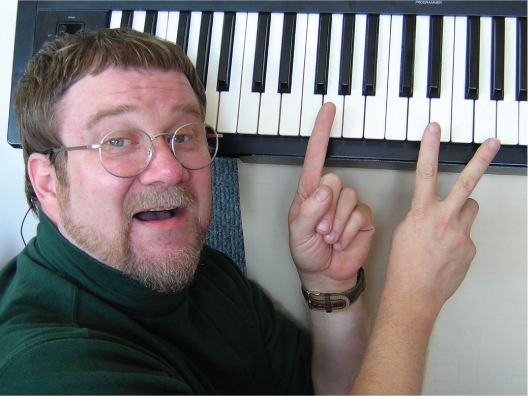
"Music is a language and it works just like the languages you already know! Thinking of it this way makes it much easier to learn."
"Music is a language. Ever heard anything like that before? We mean that literally. As we go through the program, we will come up with countless analogies between music and whatever other languages you might speak that will show you just how true that statement is. Don't you feel like you are being communicated with when you listen to great music? It makes us feel things. It tells us stories. It brings images into our mind's eye ... just like any language. Folks that can improvise will tell you that soloing is like having a conversation with the music itself as well as the other players in the band. You can really pour your heart and soul out in a good guitar solo! I think I really learned that from my dear friend and teacher, the legendary jazz violinist Dick Wetmore. He spoke through his music. It was like he was telling you a new story every time he picked up that fiddle.
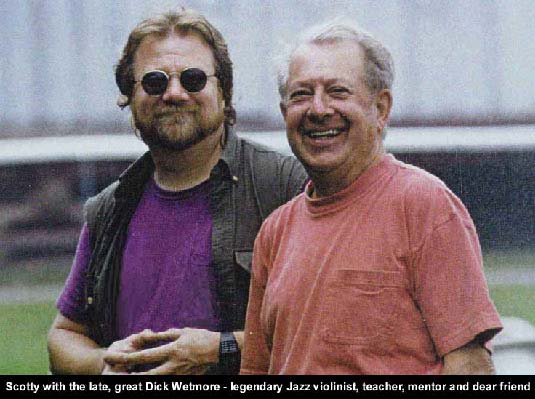
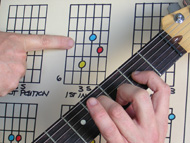
Here are some more practical examples. Like any language, music has an alphabet as you probably know. We select units out of that alphabet and form them into different patterns. In the English language, we call those patterns words and there are lots of different types of words ... nouns, verbs, adjectives, etc. The same thing happens in music. You have your musical alphabet...you select units out of it and form them into patterns ... but here we call them chords, scales, melodies, harmonies etc. It's all truly fascinating and easy to understand this way. There is no mystery to how music works. It's all pretty much common sense.
If music is a language, than what is your guitar? It's just the machine that you execute the language on. You make the machine speak for you by manipulating it with your fingers. You can view it as being very much like a typewriter on which you type the language of music. It's that simple! The interesting thing is, it's not such a big part of the process as many people think. The music doesn't come from your guitar. it comes from you!. I always say ... "You don't play the guitar with your fingers. You play it with your head!" If you don't understand how the language of music works, how do you ever expect to understand the guitar?
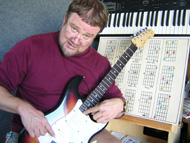
Think of it this way. You're here to become an artist in the language of music. But what if you wanted to be an artist in the English language ... a novelist, poet or journalist. You would definitely need some kind of machine to work with ... right? It could be as simple as a pencil, or maybe a typewriter or a word processor in your computer. You need some kind of tool to express the language. But ask yourself this question. Does the typewriter write the book? No ... of course not. You write the book by commanding the language in your mind. Then hopefully you understand enough of how the instrument works so that you can get your message out through your fingers so the audience can partake in this work of art you created in your mind.
The problem with the way a lot of folks try to learn the guitar is that they want to go right to the typewriter before they know anything about the language it types. People go ..."Show me how to move my fingers on this mysterious machine". But that would be like tapping on a typewriter without knowing what the words mean... not knowing how they're spelled ... not knowing what the words sound like. That sure would be a dead end in the English language. You'll find that it's a dead end in music too. And there are plenty of teachers who are all too happy to lead you down that road ... programs that swear to have you playin' like Hendrix in an hour for $19.95 ... yeah right!
Tired of not "getting it"?

Frustrated trying to learn to play guitar without understanding the fundamentals of music? Scotty's DVD guitar lessons can help.
Another cool thing is that once you understand the language, it's easy to see how the typewriter works ... isn't it? Didn't you pretty much teach yourself to use a typewriter once you understood how the English language worked? I'll have you understanding your guitar better than anyone else you know in just one lesson! It ain't rocket science after all. And once you understand the language, you can apply it to any style of music you like. Think English language again. If you truly know the language, one minute you can be reading a classic novel ... then later, a horror story ... and then a technical manual ... and still later, a comic book. Now think music language. The classic novel is classical guitar. The horror story is heavy metal. Jazz is like the tech manual and punk rock is the comic book. See what I mean? It's still all the same language.
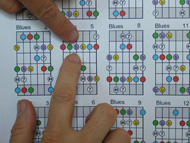
Folks often try to avoid learning how the language of music works because they have been given the impression that this stuff is impossibly complicated, boring and dry. We've all heard the horror stories about people who took lessons from some guy ... or tried to take the music course at school ... or tried to read some music theory book and came away more confused than when they started. But that's not because music is all that hard to understand. It's just so often taught really badly that people think it's confusing. I started looking for the answers when I was a kid, but I was in my 20s before I found my first really good teachers ... the ones that got me to see how simple and elegant the whole language really is.
The problem is that so many programs present their information in the wrong order. You wind up with a bunch of scattered facts but you can't see how it all comes together. When I started teaching, I set it as my goal to figure out the correct order to present the material in so folks could grasp the concepts quickly and easily. That was 28 years ago and I pretty much have it nailed. My students never have trouble understanding music the way I teach it. It was then simply a matter of getting it down on video. That took 9 years. The result is this video home study program. This is the exact same program I have shared with thousands of private students here at my studio in Massachusetts, and after 12 years of global internet sales and thousands of units sold worldwide, we still retain a 100% satisfaction rate. We're very proud of that. We must be doing something right!
Our humble thanks to our fans and former students who call and email us to tell us how they're progressing and recommend us to their friends and online contacts. We love hearing from you all. Continued success!
— Scotty West
CLICK HERE TO PURCHASE COURSE HANDBOOK!